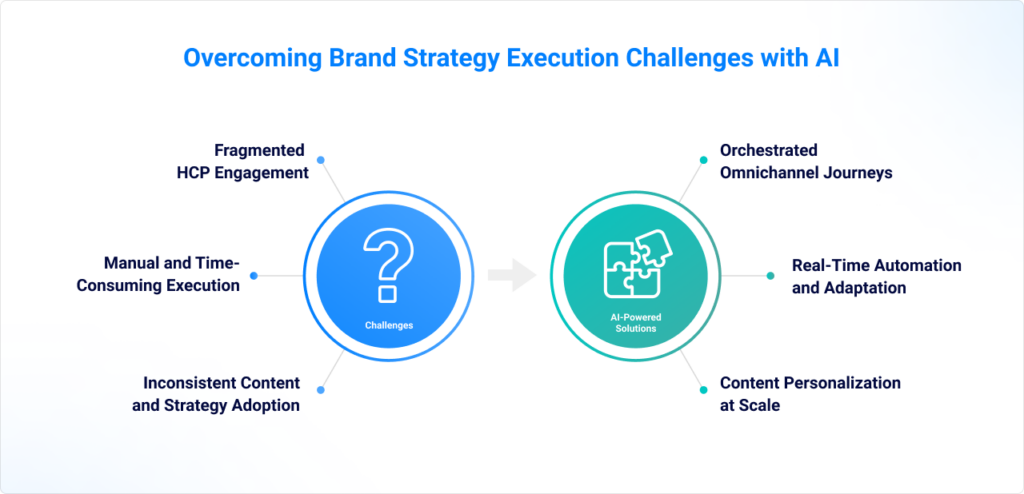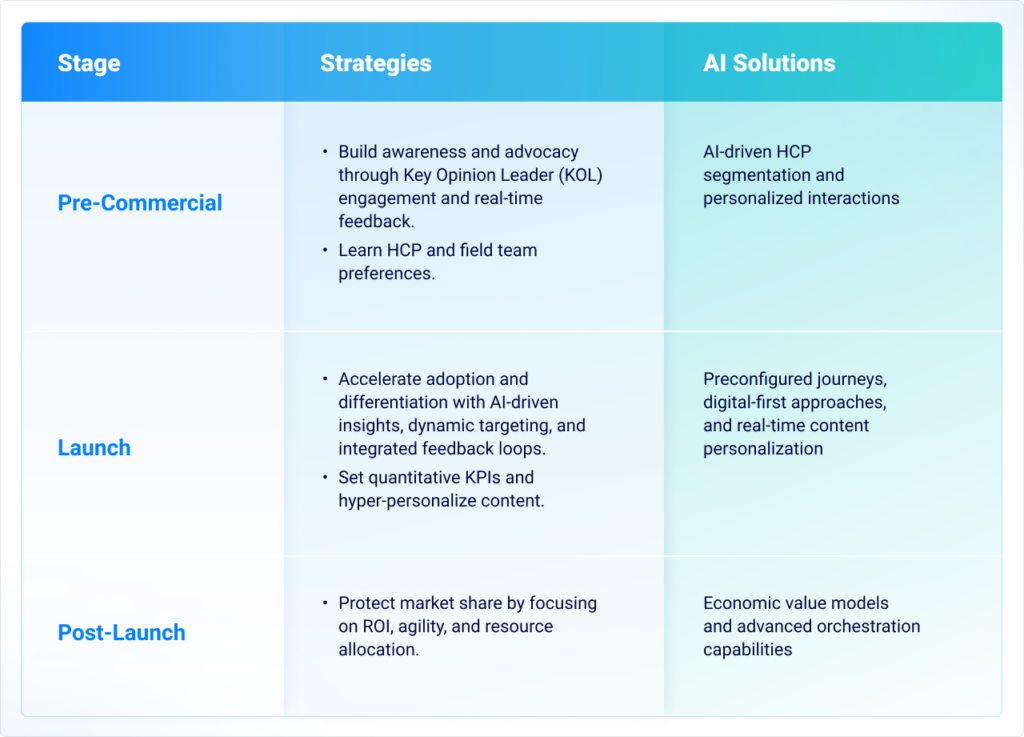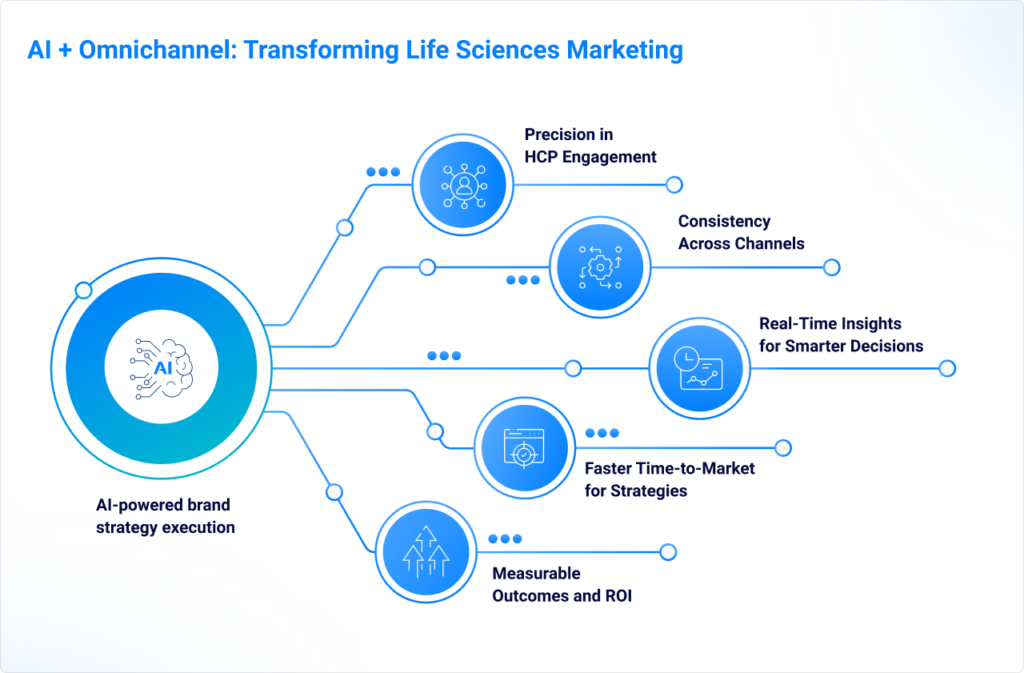The pressure to deliver impactful brand strategies has never been higher for life sciences teams. Teams face mounting challenges—balancing innovation and resource allocation with operational constraints—all while navigating a fast-evolving, AI-driven, omnichannel world. How can brand teams achieve clarity amidst this complexity?
The answer lies in approaching brand strategy execution with a different lens.
This blog builds on insights from Aktana’s “From Product to Practice” webinar series, highlighting practical applications of AI and omnichannel innovation. By leveraging Aktana’s experience with customer implementations, this series demonstrates how AI enhances brand strategy adherence, field intelligence, and customer engagement. In this session, Aktana’s Jeremy Flax, VP of Product Strategy, and Sandeep Kapoor, Senior Director of Product Management, delved into real-world applications of AI in executing brand strategies. They covered key topics such as employing AI and omnichannel engagement to drive stronger brand strategy adherence, enhance the use of brand-developed content, accelerate HCP adoption, and refine strategies in real-time.
Navigating Change: The Need for Intelligent Brand Strategy Execution
The life sciences sector is at a crossroads. Resources are fewer, and cost pressures are rising. Rapid product launches demand agile go-to-market approaches while technological challenges– like CRM migrations– add further complexity. To stay competitive, teams must adopt modern, AI-powered commercial strategies. Intelligent tools can help streamline collaboration, personalize content and journeys, and boost ROI by aligning brand strategies with execution.
These innovations can deliver value in three areas for brand and commercial effectiveness leaders:
- Journey and Content Personalization: Previously, brand teams relied on ad-hoc analytics to guide strategy and content. Simple, rules-based targeting and messaging dependent on human oversight made it difficult to overcome HCP access barriers scalably. AI replaces this outdated targeting with persona-driven, KPI-aware models that dynamically refine strategies. The result? Every interaction becomes more relevant, leading to measurable engagement gains.
- Frequency of Strategy Evolution: Strategy effectiveness was reviewed very infrequently in the past, and execution suffered. With AI orchestration, measuring brand strategy impact becomes much simpler with KPI-aware models that continually learn, refine, and iterate. This level of AI-driven guidance can more than double brand strategy execution levels, leading to better ROI and much faster learning cycles.
- Brand Manager Engagement: Real-time refinement tools enable brand managers to adjust strategies and track performance metrics dynamically and effectively. By integrating AI-powered analytics and HCP personalization with field collaboration, brand teams can customize field approaches that maximize impact while staying within budget and timeline constraints.

Managing Complex Product Lifecycles with AI Precision
Without AI guidance, teams often face data overload. Prioritization becomes challenging as brand leaders balance strategy, revenue, and cost constraints across multiple products in various product lifecycle stages. This often leads to resource conflicts and misaligned KPIs. However, well-orchestrated AI can support brand strategy across the product cycle.

Dynamic AI systems can offer practical and scalable support for evolving brand priorities throughout a product’s lifecycle. This allows brand teams to achieve consistent performance and results even within the complex and highly regulated life sciences environment.
Real-World Scenarios: Transforming Brand Strategy with AI
As outlined, AI drives value for brand teams in three areas: it personalizes HCP journeys and content, advances HCP adoption strategies, and offers tools for real-time strategy refinement. Here are practical examples of how brands have used AI throughout the product lifecycle to achieve these objectives:
Scenario 1: Journey and Content Personalization
In the pre-commercial phase of a new product, the brand’s primary goal was to grow awareness and engagement with a large HCP population. The brand team faced significant challenges: limited content availability, sparse data, and no clear baseline for target engagement.
The team prioritized digital channels as a cornerstone of their strategy. With a large target audience, digital engagement provided an opportunity to learn and adapt quickly, even with limited content.
AI tools offered a clear solution to the limited data challenge. By starting with expert-driven content assignment tables, the team could define an initial content deployment strategy. The team leveraged historical data from similar HCP populations to generate personalized journeys and implemented a continuous feedback loop with periodically updated AI models.
The measurement strategy focused on HCP engagement and sales rep alignment. Early wins highlighted the importance of true omnichannel orchestration, where digital strategies complemented high-value HCP interactions managed by field teams. By fostering collaboration between marketing and sales, the team built trust incrementally and achieved measurable success.
Key Outcomes: Improved HCP engagement metrics, better alignment with sales reps, and a foundation for scalable omnichannel orchestration.
Scenario 2: Moving HCPs Up the Adoption Ladder
In this case, the brand’s goals were to grow market share and protect its established base, targeting HCPs categorized as writers and dabblers over the past 2-3 years. The challenge was identifying potential writers who had been overlooked during prior engagements, with a focus on ROI.
Field engagement remained a dominant channel, but the strategy included increased digital allocation to enhance ROI. The team deployed two pre-configured AI-driven journeys using a deep reinforcement learning model fine-tuned to optimize results for specific business goals. This was tied with an economic value function– a dynamic scoring model prioritizing high-ROI actions at the individual HCP level.
The measurement strategy focused on ensuring HCPs moved up the engagement ladder and maintaining the existing base while onboarding new writers. Collaboration with internal data science teams refined the initiative and built trust across stakeholders.
Key Outcomes: Enhanced ROI through targeted actions, a balanced approach to retaining and growing the HCP base, and successful integration of rules-based and AI-driven strategies for scalable and effective results.
Brand Manager Engagement
Brand managers can ensure their strategies are effective and adaptable by focusing on streamlined metrics, AI-driven insights, collaboration, and consistent refinement. Limiting KPIs to three essential metrics—a leading indicator like journey progression, a business metric such as NRx, and an engagement metric like content interaction—provides a clear, balanced view of performance while reducing complexity.
Tools like Aktana’s Strategy Console make performance tracking intuitive with pre-configured KPIs such as audience reach and content adoption rates. These tools deliver real-time insights, enabling brand teams to refine strategies dynamically. Simplified dashboards further foster cross-functional collaboration by helping teams align on priorities without getting bogged down in overly detailed reports.
Additionally, continuous measurement and refinement are critical to success. Regularly evaluating performance against consistent KPIs helps teams quickly identify gaps. Clear metrics, actionable insights, and proactive adjustments empower brand and commercial managers to stay agile and achieve measurable impact.
The Path Forward: Driving Success with AI-Powered Brand Strategy Execution
The evolving demands of the life sciences sector require a shift from static brand strategies to dynamic, AI-driven approaches. Next-generation AI tools simplify complexity, improve engagement, and enhance brand strategy adherence, empowering teams to:
- Deliver personalized HCP experiences that boost engagement and ROI.
- Accelerate strategy execution through real-time insights and agility.
- Achieve sustainable advantages by fostering a learning organization.

As seen in real-world scenarios, success lies in combining data-driven insights with a commitment to continuous refinement.
The journey from product to practice begins with these transformative approaches. Ready to elevate your brand strategy? Watch the full webinar to explore actionable insights and see Aktana’s solutions in action.

